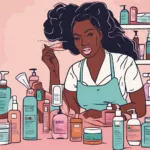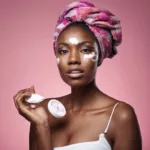29 November 2023
The FDA proposes a ban on formaldehyde in hair straightening products, highlighting the health risks faced by Black women.
For Jeanette Toomer, the hours she used to spend ensuring her hair was perfectly done-up years ago was not just a matter of style—it was a cultural statement. As a Black woman who came of age in the 1970s, Toomer favored natural hairstyles over those that required the use of chemicals—a nod to the self-empowerment and return-to-our-roots ethos that rippled across the African-American community in the years after the civil rights movement.
However, worried that her natural styles would not be taken seriously as she pursued an acting career, Toomer began using chemical straighteners—many of which relied on the toxic substance formaldehyde, a known carcinogen—to straighten and smooth her naturally curly hair. Now, Toomer fears the straighteners may have exacted a terrible toll: in 2021, after more than four decades of regularly using formaldehyde-based relaxers, she was diagnosed with stage 4 endometrial cancer, which she believes can be traced back to her use of hair straighteners.
Last month, the Food and Drug Administration (FDA) proposed a ban on the use of formaldehyde and other formaldehyde-releasing chemicals in hair straightening or smoothing products, citing the chemical’s links to cancer and a range of other adverse health effects. This move has sparked a larger conversation about the lax regulation of beauty care products and its impact on women of color, particularly Black women.
Disproportionate Impact on Black Women
African Americans make up 14 percent of the population but spend nine times more on ethnic hair and beauty products than non-Black women, according to a recent Nielsen report. This disproportionate impact highlights the need for stricter regulation and increased awareness of the potential health risks associated with these products.
The Science Behind the Ban
Formaldehyde has long been recognized as a hazardous substance, with the Environmental Protection Agency classifying it as a “probable human carcinogen” in 1987. The International Agency for Cancer Research also released a similar finding a year later. The FDA’s proposed ban on formaldehyde in hair straightening products is based on scientific studies linking the chemical to various health issues, including certain cancers, respiratory problems, and skin conditions. The ban aims to protect consumers, particularly Black women, who are more likely to use these products.
The Role of the FDA and Legislative Changes
The FDA’s lack of authority to regulate cosmetic products and their ingredients has hindered efforts to address the risks posed by toxic substances in beauty care products. However, the Modernization of Cosmetics Regulation Act (MoCRA), set to go into effect next month, will grant the FDA new authority to regulate the beauty industry. While this represents a significant step forward, advocates argue that more needs to be done to ban other potentially dangerous ingredients and ensure the safety of all beauty and personal care products.
Lobbying and Industry Influence
The Personal Care Products Council, a trade group representing the majority of the American beauty industry, has spent millions of dollars on lobbying efforts to influence regulations around cosmetics. The effectiveness of their advocacy has been evident in the limited changes to cosmetic regulations since 1938. Critics argue that the industry’s influence has hindered meaningful reform and prevented stricter regulation of potentially harmful ingredients.
The Environmental Injustice of Beauty
The use of toxic chemicals in beauty products disproportionately affects women of color, who are more likely to use a greater number of products and face poorer health outcomes. The pressure to conform to Eurocentric beauty standards and the lack of safer alternatives contribute to the environmental injustice of beauty. Researchers and advocates argue for a comprehensive approach to address the use of harmful ingredients in all personal care products and promote safer alternatives.
Conclusion:
The proposed ban on formaldehyde in hair straightening products is a significant step towards protecting the health and well-being of women, particularly Black women, who have been disproportionately affected by lax regulation in the beauty care industry. However, more comprehensive changes are needed to ensure the safety of all beauty and personal care products. The FDA’s new authority under the MoCRA is a positive development, but ongoing efforts are necessary to address the environmental injustice of beauty and promote healthier alternatives for all consumers.



